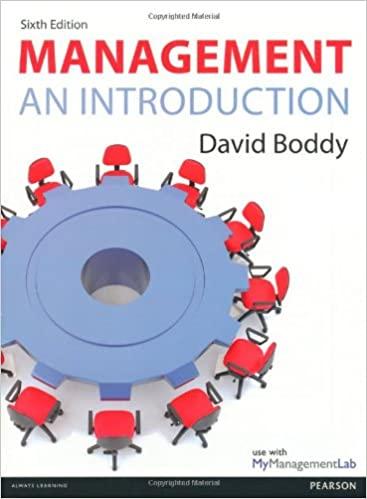Question
Collusion: Exploitation or benefit? In 2011, two soap and detergent firms, Unilever and Procter & Gamble, were fined a total of 315m (US$ 220m) for
Collusion: Exploitation or benefit?
In 2011, two soap and detergent firms, Unilever and Procter & Gamble, were fined a total of 315m
(US$ 220m) for fixing the price of washing powder in eight European countries. Procter & Gamble
is the world's largest consumer products company. The two firms had colluded over prices for more
than three years. The collusion began when they agreed to implement an industry-wide program to
improve their environmental impact by obtaining their raw materials from sustainable sources. They
also agreed to reduce the amount of packaging they used but to keep the prices unchanged. Then,
later, they collectively agreed to raise prices in Belgium, France, Germany, Greece, Italy, Portugal,
Spain and the Netherlands. This collusion was against the European Union competition laws and was
regarded as 'unfair competition'.
Some information from the 2010 financial report of Procter & Gamble (P&G) is shown in Table 1.
Table 1: Annual Report of Procter & Gamble
2006 2007 2008 2009 2010
Total Revenue US$ million 64416 72441 79257 76694 78938
Profits US$ million 8684 10340 12075 13436 12736
Distributed Profit per Share
US$ per share
1.1 1.28 1.45 1.64 1.80
The report states that 'No company in the world has invested more in market research than P&G. We
conduct over 20,000 research studies every year. Over the past 15 years, P&G had 125 notable
innovations - more than our six largest competitors combined. P&G is the brand-building leader of
our industry with 50 brands that are among some of the world's best-known household names - and
which together make up 90% of P&G's sales and more than 90% of profits.
P&G is creating the advantage of large scale by integrating across our different businesses and
markets, allocating resources more efficiently than any small business can do on its own.'
(Source: Adapted from P&G Annual Report 2010)
Questions:
a) Explain what is meant by 'collusion' and when it is most likely to occur in an industry. [5 points]
b) Analyze, using Table 1, whether price fixing benefited Procter & Gamble. [ 5 points]
c) Suggest why creating the advantage of large scale by 'integrating across its different businesses'
might benefit a firm. [5 points]
Step by Step Solution
There are 3 Steps involved in it
Step: 1

Get Instant Access to Expert-Tailored Solutions
See step-by-step solutions with expert insights and AI powered tools for academic success
Step: 2

Step: 3

Ace Your Homework with AI
Get the answers you need in no time with our AI-driven, step-by-step assistance
Get Started


